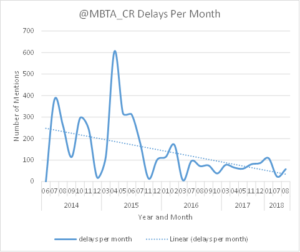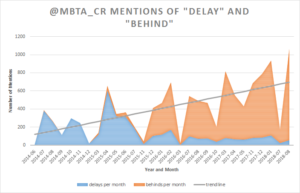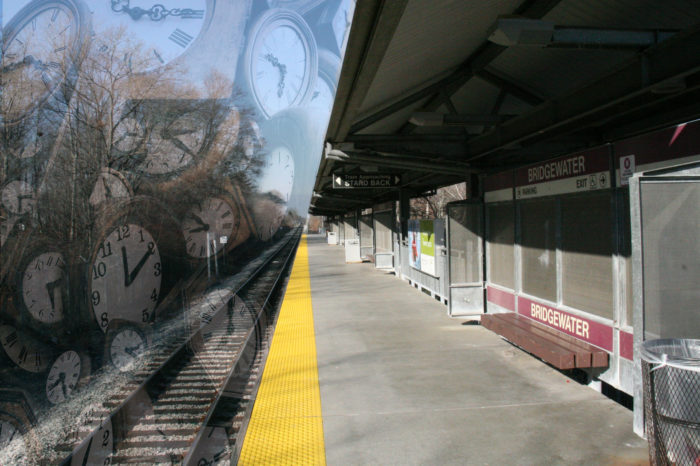Commuter Rail Twitter Reveals History of Delays
An easy way to bond with fellow Bostonians is to complain about commuter rail. While it’s often regarded as unreliable, unexplainable, and unresponsive, a weakness in the transparency of MBTA performance data makes these claims no more than conjecture. True, the agency has made vast improvements in making its operation public in recent years, but there is more work to be done.
While State of Service Reports will list miles between failure, ridership statistics, and causes for delays, the MBTA had not release a count of postponements; at least not until corporate social media accountability became the trend, and MBTA Commuter Rail got a Twitter profile.
A short computer script downloaded all of the @MBTA_CR profile’s tweets. Their first one, on June 18th, 2014 at 1:46 pm, reads:
“This account will begin tweeting live on July 1st! Follow for the latest information on updates & alerts regarding @MBTA commuter rail lines”
Over the last four years, @MBTA_CR has attempted to alert passengers of every delay and notice regarding commuter rail. Pioneer counted 503 apologies, 4,149 mentions of delays, and 7,701 alerts that a train was running “behind”. The numbers translate to about three delay reports a day:

Commuters might be surprised to learn that the number of delays seems to be decreasing. MBTA Back on Track, the MBTA’s data website, reports that the commuter rail’s “percent on time” averaged 90% at the beginning and end of 2017. Is this more of a PR move than an actual improvement in service?
While the MBTA twitter mentioned fewer “delays”, they began to refer more frequently to trains being “behind” schedule — at a rate that at first replaced and then exceeded their original delay announcements:

While the language may have changed, the performance hasn’t. To a commuter on his or her way to Boston, it doesn’t really matter what the MBTA calls their tardiness. A late train still translates to missed meetings.
The MBTA should be given credit for numerous improvements in infrastructure and transparency over the past several years. Their data dashboard proudly announces their 1.17 million daily ridership, and admits which services are less reliable (like buses, with a with an average 46% reliability in August 2018). While these are steps in the right direction, the majority of riders won’t check a data dashboard to find out if their train is running late; they’ll be waiting for a notification from @MBTA_CR to pop up on their phone. The average commuter doesn’t read reports on reliability, but they remember how many times a train is late, and come up with their own individual risk assessments when planning their next ride.
For non-riders scrolling through Twitter, announcing that a train is “running behind” sounds lovely. It implies that no one should worry, because commuter rail is still chugging along towards its destination. But for someone actually trying to get from A to B, it obfuscates the reliability of our transit system. If there’s one thing Boston doesn’t mind, its bluntness—and the MBTA twitter accounts should either stick to calling a delay a delay, or plainly explain why they won’t.
While the MBTA has been working to improve communication with riders, a lack of full transparency makes it harder to see the big picture. If their Twitter properly reflects service statistics, their average of a delay everyday leaves massive room for improvement. Without revealing this information to the public, it will be harder to justify the inconvenience of their actions when things need to change. Keolis, the company contracted to run commuter rail, must be collecting this data– it’s how they would’ve determined what percentage of delays are from weather or maintenance. They already have a dashboard where they proudly display reliability and ridership statistics, so adding this number shouldn’t be difficult.
Saying a train is “running behind” instead of “delayed” may be a sweeter way to convey failure, but it doesn’t fix anything. It certainly doesn’t improve the public’s perception of the MBTA’s lack of reliability. The commuter rail must stop hiding behind the wall of social media and provide the public with fully transparent data. Without developer permissions and a knowledge of coding, Pioneer would not have been able to access this data. They should remember that with taxpayer money comes taxpayer oversight.
Kaila Webb is the Wellesley College Freedom Project Intern at the Pioneer Institute. She majors in Environmental Studies, as well as Chinese Language and Culture.
Update: Pioneer has spoken with the MBTA to clarify the differences between running behind and delay. Prior to 2015, trains were either delayed or not. However, some delays are temporary, as a train may speed up between stops to make up for time. Passengers would report frustration when a train reported as delayed would instead show up on time, causing them to miss their train. In an effort to increase clarity, the MBTA introduced the phrase “running behind” to explain these trains that might, in the end, end up not actually delayed.
The MBTA did not publish any written material explaining this change to the public. At the time of the change, information was conveyed to conductors to share with those that may ask, and may have been communicated through station announcements. This explains why those recently riding the commuter rail are not aware of the purposeful change in language, nor the reasoning behind the switch.
The MBTA has added 11,000 trains during the dates of Pioneer’s analysis. However, this addition of trains does not affect the change in language, nor the lack of published definitions. In 2015 and again in 2016, the MBTA twitter referred customers to their “Service Alerts and Notices” page for a definition. While the page may have once held such a definition, the Internet Archive’s October 2017 version of the page (and the current version) no longer includes such, leaving customers wondering what a “running behind” train really means.



